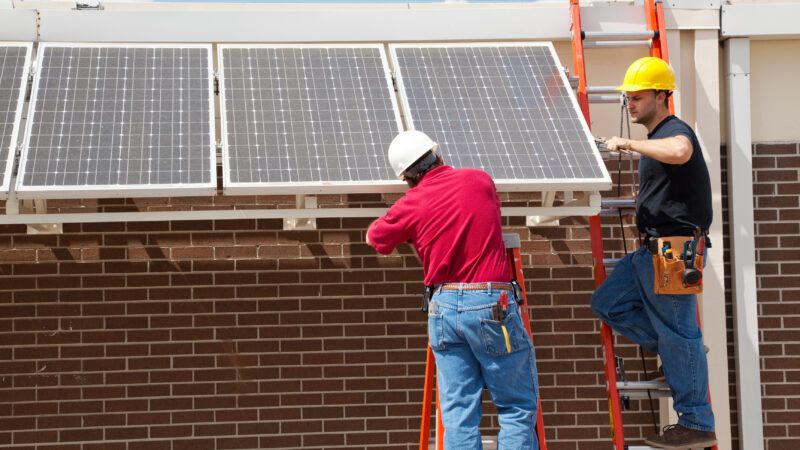Solar Panel Manufacturer That Hasn't Produced Solar Panels Since 2017 Seeks Extension of Solar Panel Tariffs
What good is protectionism that isn't protecting anything?

One of the companies clamoring for an extension of American tariffs on imported solar panels hasn't actually built a solar panel in several years—and it doesn't appear to do much of anything right now.
Suniva, an Atlanta-based firm founded in 2007, is one of two companies to formally petition the U.S. International Trade Commission (ITC) to extend former President Donald Trump's 30 percent tariffs on imported solar panels. Those tariffs, imposed in 2018 and scheduled to expire in 2022, currently add 18 percent to the cost of imported solar panels. In their petition, Suniva and Auxin Solar told the ITC that the extension was necessary "to secure America's solar energy independence."
But it's fair to ask what, exactly, this extension of solar panel protectionism is meant to be protecting. Suniva halted its production lines in 2016, according to The Wall Street Journal, and now says it will be able to restart them only if the tariffs—which, again, have been in place since 2018—are extended.
The ITC ought to be pretty skeptical of that argument. After all, Suniva declared bankruptcy in 2017—but only after receiving more than $20 million in tax credits, as Reason reported at the time.
What's Suniva up to now? It's hard to tell. The company's website does not appear to have been updated since 2016—the most recent press release available on the site is dated December 15, 2016, and touts the successful expansion of Suniva's manufacturing plant in the Atlanta suburb of Norcross. That same plant was shuttered just three months later, in March 2017, according to the Atlanta Business Chronicle. Company officials said at the time that the shutdown was "temporary." Bankruptcy filings obtained by the Chronicle in April 2017, however, suggested a bleak future for the company, which at the time had roughly 10 times as many liabilities as assets and owed money to "as many as 1,000 creditors." Suniva eventually exited bankruptcy in 2019 and was purchased by Lion Point Capital, a New York–based hedge fund.
Calls and emails from Reason to the media contact listed on that December 2016 press release went unreturned. The company's Facebook page has not been updated since 2017.
In short, about the only thing that Suniva seems to be doing these days is manufacturing requests for additional tariffs. The company, which was already in bankruptcy, was one of the prime advocates for Trump's solar panel tariffs in 2018. Most of the American solar panel industry opposed that effort at the time, due to fears that tariffs would hike prices and slash demand.
That's still true. The Solar Energy Industries Association (SEIA), a trade association, is asking the ITC to put an end to what it calls "job-killing" tariffs that have been "a multibillion-dollar drag on industry growth."
"If we hope to reach our ambitious climate goals, we must accelerate solar deployment, not hinder it with unnecessarily punitive trade measures," John Smirnow, the SEIA's vice president of market strategy, said in a statement. "The way to create more U.S. manufacturing is long-term federal investments, not shortsighted tariffs."
This is exactly the sort of thing that happens when governments start trying to pick winners and losers with protectionist trade policies. Rather than competing in the marketplace—a competition that Suniva has clearly lost, despite lots of help from taxpayers—some businesses will try to destroy their competition by influencing government policy.
It would be nice if we could assume that the ITC would laugh off Suniva's request for a tariff extension. Unfortunately, that would require confidence in the bureaucrats managing America's increasingly nonsensical trade policies.


Show Comments (37)